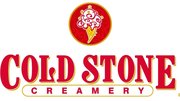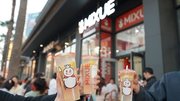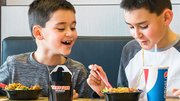Operations
Ready to scale your restaurant? Ask these 3 questions first
Uday Ahuja, chief investment officer of RSE, whose portfolio includes, Bluestone Lane, Magnolia Bakery, Fuku, Momofuku Orchard, Milk Bar and Drone Racing League, shares what investors want in a restaurant partner.

June 8, 2023 | Uday Ahuja, chief investment officer, RSE
Restaurants looking to grow have one thing in common; they need a lot of money. It's something I see daily in my role as chief investment officer of RSE, where I am focused on sourcing and evaluating investment opportunities for the firm as well as managing our portfolio and new investment activity. I also serve on the Boards of our portfolio companies including Bluestone Lane, Magnolia Bakery, Fuku, Momofuku Orchard, Milk Bar and Drone Racing League, among others.
I've learned a lot during my tenure, and my No. 1 piece of advice is that leadership must reflect honestly on whether the brand has shown the relevant metrics and performance to scale. Brands should not scale forcefully, rather there should be a strategy in place that executes the company's goals and allows for sustainable growth.
Scale can be achieved in a variety of different ways, whether through an omnichannel approach — selling through multiple channels, including retail, e-commerce — and/or CPG or by doubling down on the one channel in which the brand excels
For example, for a pizza business with great retail unit economics, it may not make sense to diversify into multiple channels but to focus on scaling retail locations with repeatable and consistent performance. There's no "one-size-fits-all" strategy.
Whether solely brick and mortar or more omnichannel like direct-to-consumer/CPG, investors are generally looking for repeatable concepts with consistent performance across various markets, as well as locations and units.
At RSE, we have been focused on CPG brands as these types of products generally offer the opportunity to expand nationwide relatively efficiently and economically.
What are investors looking for? What does a brand need in order to look investment worthy?
In our current economic climate investors are generally looking for a brand's ability to scale vertically and horizontally, as well as a brand's profitability and unit economics. This helps diversify the risk in an investment's business model and shows the potential for continued growth in all directions. Many investors, particularly in the restaurant industry, are also looking for brands that have a sustainable business with a solid foundation and fundamentals.
At RSE this looks like evaluating a potential restaurant investment's traction beyond the proof of concept, initial units, and repeatability of financial performance. We like to focus on a brand's ability to diversify revenue streams, something that was a priority for us before the pandemic but has become even more important following. For example, our brand Milk Bar gained strong traction during the pandemic thanks to its DTC channel and grocery line (which launched in April 2020). This allowed the business to grow while others continued to play defense.
Conclusion
Given the current fundraising environment, as entrepreneurs consider raising capital, it's important to ask yourself some tough questions: Is my idea ready for outside capital? What will investment capital do for my business? Can I bootstrap until the macroeconomic environment improves so that I give myself the best shot at success and minimize dilution?
If you're ready to go, as you look for investment partners, there's no substitute for networking. It's easy to get discouraged when you're out pitching your idea and the first five, 10, 15 investors say something to the effect of "It sounds interesting, but it's not a fit for us."
If you have conviction in your idea and are determined to raise capital, it's important to connect every dot and take every meeting and introduction. There will be one or two along the way that might go the distance.












